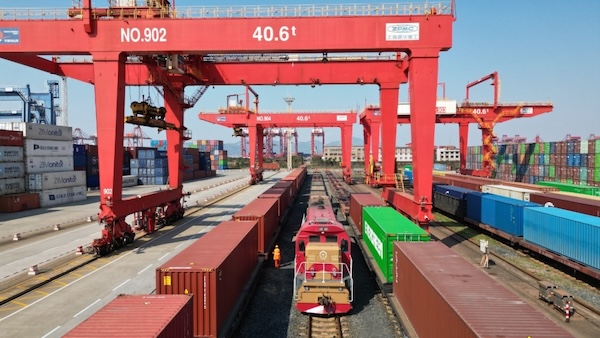Ningbo's biodiversity conservation efforts applauded at COP16

Ningbo Zhoushan Port. [Photo/cnnb.com.cn]
During the 16th Conference of the Parties to the Convention on Biological Diversity held on Oct 27 at 13:00 local time in Colombia, Ningbo shared its experiences in biodiversity conservation and received accolades from participants.
Ningbo, renowned for its robust industrial economy, which ranked seventh nationwide in terms of industrial output value last year, is home to a diverse array of species, with a documented count of nearly 2,700 wildlife and plant species, including over 1,000 marine species.
Addressing the challenge of integrating industrial development with biodiversity conservation, Lu Zichuan, head of the ecological department of the Ningbo Municipal Bureau of Ecology and Environment, underscored Ningbo's dedication to international collaboration and innovative strategies for urban biodiversity conservation.
Over the past two decades, the local government has partnered with the Global Environment Facility on a number of projects, covering areas such as wetland conservation, building energy efficiency, solid waste management, carbon neutrality, securing a total grant of $19.81 million.
In 2005, the Ningbo-Hangzhou Bay Wetland Conservation Project was initiated with nearly $5 million in grants from the GEF and the World Bank.
Presently, the Hangzhou Bay Wetland has a high level of biodiversity, being home to 303 bird species, with one-fifth of them included in the national key protected wildlife catalog. It has emerged as a symbol of top-tier development in the Qianwan New Area, attracting more than 23 Fortune 500 companies and achieving a regional GDP of $91.39 billion last year.
The Ningbo Biodiversity Conservation Strategy and Action Plan launched this year is a significant sub-project under the China Green and Carbon-Neutral City Project (Ningbo), receiving a grant of $1 million.
One of the pivotal endeavors includes the establishment of the nation's first bio-friendly city in Ningbo’s Yinzhou district. Since the start of this year, the district has been actively mitigating the impact of high-grade road construction on biodiversity, creating over 1,100 hectares of green space in parks.
Wang Xueman, a senior urban expert at the World Bank, emphasized the rigorous standards of the GEF's grant projects. He highlighted Ningbo's institutional and operational innovations, which position the city at the national and provincial forefront in biodiversity conservation. Wang expressed eagerness to expand and deepen collaboration with Ningbo in order to set a precedent for Chinese cities in advancing the "dual-carbon" initiatives.

 Ningbo seabird project seeks international volunteers
Ningbo seabird project seeks international volunteers  Jakub's journey: From shipyard to sea
Jakub's journey: From shipyard to sea  Badminton Asia COO applauds Ningbo
Badminton Asia COO applauds Ningbo 


